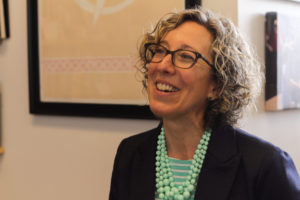By: Melissa Fraser, Staff Writer
The U.S. Senate released a report last week criticizing the Confucius Institute (CI) at U.S. universities. Despite the global political controversy, USM’s relationship with the Chinese learning center remains intact.
The report states that CIs are currently operating in over 100 U.S. universities and are largely staffed and funded by an agency of the Chinese government’s Ministry of Education, the Office of Chinese Languages Council International, better known as the Hanban.
According to the CI website, the program came to fruition in 2004 with goals to develop cultural globalization and build a “harmonious world” through the teachings of language and culture.

The CI has long been controversial, according to an article published by Inside Higher Ed. The report states that “over the past five years, more than a dozen U.S. schools closed their Confucius Institutes or refused to extend their contract with Hanban.”
Findings from the Permanent Subcommittee on Investigations highlighted concerns, stating that “Confucius Institute funding comes with strings that can compromise academic freedom.”
The Chinese teachers are required to sign a contract pledging that they will not damage the national interests of China, the review states that “such limitations attempt to export China’s censorship of political debate and prevent discussion of potentially politically sensitive topics.”
The review claims that CIs are a propaganda tool “aimed at attempting to change the impression in the United States and around the world that China is an economic and security threat.”

It also states that CIs operate with “little-to-no transparency” and propose that without “full transparency regarding how Confucius Institutes operate and full reciprocity for U.S. cultural outreach efforts on college campuses in China, Confucius Institutes should not continue in the United States.”
As stated on the USM website, the mission of the CI at USM is to “serve the growing demand within the university and the community for greater knowledge and understanding of Chinese language, culture, and history.”
Known for her desire to increase USM’s exposure worldwide, former USM President Selma Botman expressed interest in pursuing a relationship with China during her tenure in 2012. According to Dr. Joseph McDonnell, who served as Provost at that time, they worked together to initiate the CI application process.
Prior to joining USM, McDonnell had served at Stony Brook University as a member of the CI Advisory Board. Representing USM, a university with no ties to China, his former colleagues advised him that CI was the best way to start to build a relationship.
The application process went on for two years. McDonnell said that their efforts included travel to China, to address the people of Hanban. Maine’s congressional delegation also wrote letters of support.
In 2014, USM established a partnership with Dongbei University of Finance and Economics (DUFE) in Dalian, China. According to the USM website, the university is known for focusing on economics, law, management, arts and science.
McDonnell describes DUFE as a “strong” university, “much larger than ours, different in scope because they have 20,000 students and a Ph.D. program.” He also speaks to the similarities — coastal location, mild climate, vibrant city — that were a natural draw.
“What we’re doing is completely non-controversial,” McDonnell said, “I don’t see that there’s any interest on the part of our partner university to do anything other than provide a relationship where we can learn about Chinese language and culture.”
Generally the funding investment by CI is substantial, the Senate Subcommittee found that China directly provided more than $158 million in funding to U.S. schools for CIs. A typical start-up fund for one university can range between $100,000 to $200,000.
According to Brianne Hodgkins, the CI Program Coordinator, USM received an initial funding amount of $150,000, allocated to creating a space for the institute and “other related start-up costs.” Additional funds are received annually from Hanban based on planned programs for the given year.
The Subcommittee review states that host universities provide resources, physical space for the CI, administrative support and an American director. Hanban then provides its funding, course materials such as textbooks, Chinese teachers and a Chinese director. According to Hodgkins, USM has upheld this structure.
“The Confucius Institute delivers to us teachers of Mandarin, and we don’t choose those teachers, they’re given to us,” USM Provost Jeannine Uzzi said. “They are overseen by the chair of the linguistics department, who observes their teaching. They are treated like the other part-time faculty within the department.”
USM currently offers two undergraduate language courses, CH101 and CH102, Beginning Chinese. According to Uzzi, it’s required for students to complete these courses to be eligible for the scholarship funding from CI to study abroad.
Students interested in studying abroad in Dalian with DUFE have the option of attending for two weeks, a single semester or a full year at a little-to-no cost to them, with scholarships available. According to materials provided by the CI at USM, the award package covers tuition, room, board, travel and a 2,500 CNY monthly living stipend.
Jamie McCatherin, a senior at USM, spent two weeks in Dalian and Beijing over the summer and decided to return for a full semester in the fall. According to McCatherin, he witnessed political practices that shocked him during his stay in China, but those experiences were entirely separate from DUFE.
“Being in China, of course, I experienced things I would see politically that were sort of like ‘wow, that’s really what’s happening here?’” said McCatherin. “But as far as the Confucius Institute, especially at USM, I’ve seen absolutely nothing remotely concerning. It’s really just language and a little bit of culture.”
McCatherin, now proficient in conversational Mandarin, says that he benefited greatly from the language courses offered to him at DUFE. Each class was focused entirely on language comprehension, writing, pronunciation and listening.
“The Confucius Institute teaches Chinese language, it doesn’t serve any other function at the University,” McDonnell said, “there’s no teaching of Chinese philosophy, Chinese government, anything like that.”
The CI at USM also offers events promoting Chinese culture, such as dumpling making, musical performances, celebrations of the Chinese New Year and the Mid-Autumn Moon Festival.
“If there was no Confucius Institute, I think our Chinese program would literally disappear almost instantly,” McCatherine said. “I think a lot of the concern with the senate is it’s living in our educational system and China is controlling it. But the thing is, China funds all of it, of course they’re controlling it.”
“Our Confucius Institute here has never given me cause for concern and I’ve looked into it carefully because I was concerned when I came on board,” said Uzzi.
In 2018, Uzzi decided to renew USM’s five-year agreement contract with Hanban. Uzzi said that she took time to investigate and research the program, how it was benefiting students and the budget investment from the university.
USM remains the only university in the state with a CI.
“I understand that there are things about the larger organization that I don’t know, but I do know the work that they do here, and I know that it benefits our students.” Uzzi.

